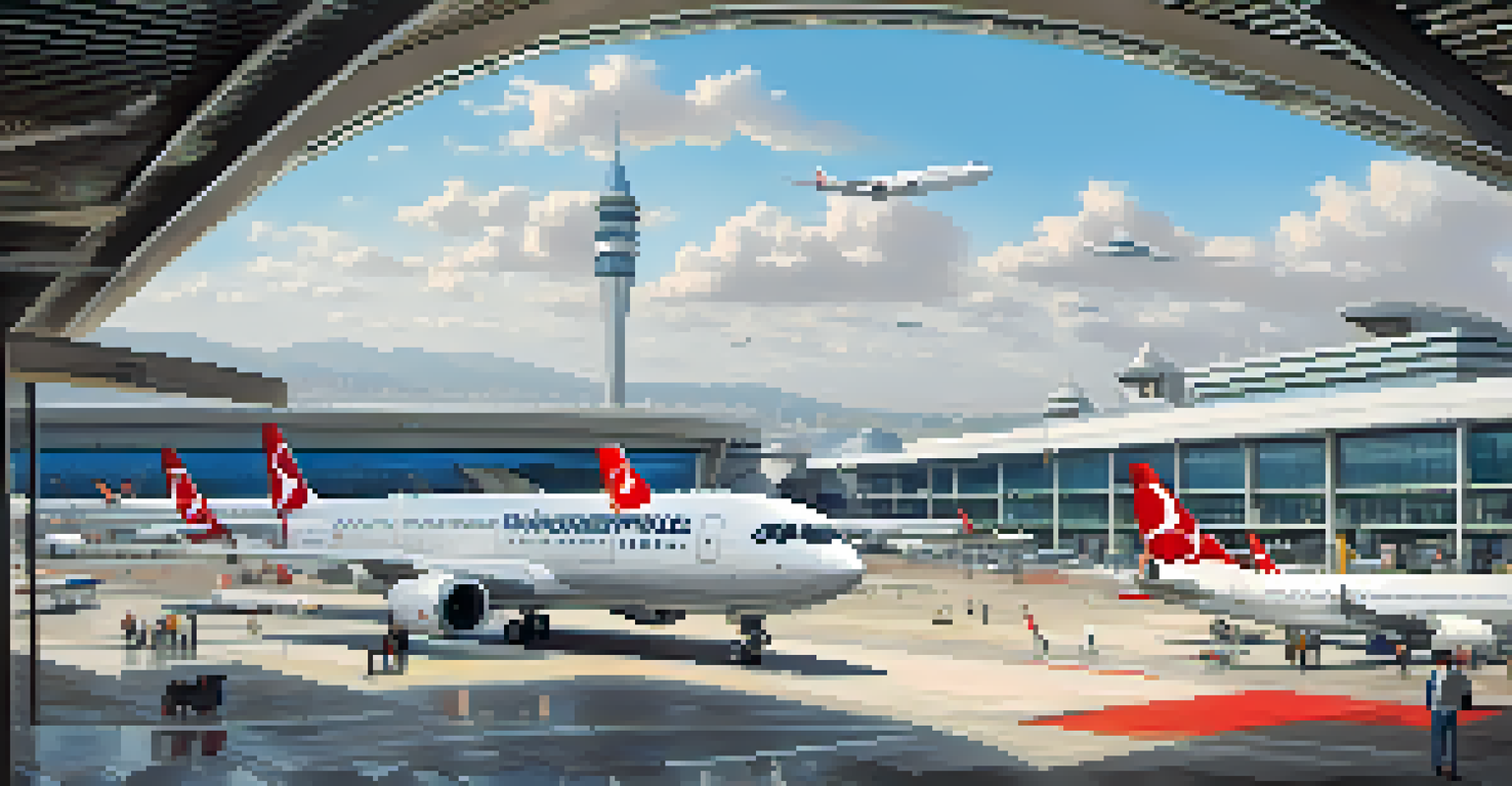Turkey's Strategic Position in Global Business Landscape

Turkey's Geographical Advantage in Trade
Turkey's unique location at the crossroads of Europe and Asia makes it a pivotal player in global trade. This strategic position allows for easy access to major markets, facilitating the movement of goods and services. Think of it as a bridge connecting the East and West, where businesses can tap into diverse consumer bases.
Geography is destiny.
In addition to being a natural gateway, Turkey boasts well-developed transportation infrastructure, including highways, railroads, and ports. This enhances its appeal as a logistics hub, making it easier for companies to distribute products across continents. For instance, Istanbul's port is one of the busiest in the region, further solidifying Turkey's role in international shipping.
Moreover, Turkey is part of several trade agreements, such as the Customs Union with the European Union, which further encourages trade by reducing tariffs. This combination of geographical advantage and favorable trade conditions positions Turkey as a vital player in the global business landscape.
Diverse Economy Fueling Growth Opportunities
Turkey's economy is one of the most diverse in the world, encompassing agriculture, manufacturing, and services, which creates a wealth of opportunities for businesses. This diversity means that companies can find various niches to explore, whether in textiles, automotive, or technology. Just like a well-stocked pantry, Turkey offers an array of ingredients for businesses to create their unique recipes for success.

The manufacturing sector, in particular, has seen significant growth, with Turkey becoming a hub for industries like automotive and electronics. This industrial base not only caters to domestic demand but also serves export markets, enhancing Turkey's role in global supply chains. For example, many global car manufacturers have established production facilities in Turkey to leverage its skilled workforce and strategic location.
Turkey's Strategic Trade Location
Turkey's unique position at the crossroads of Europe and Asia facilitates global trade and access to major markets.
Furthermore, the services sector is rapidly expanding, especially in areas like tourism and finance. With millions of tourists visiting annually, the tourism industry bolsters other sectors, creating a ripple effect of economic activity. This multifaceted economy positions Turkey as a dynamic player in the global market.
Young and Dynamic Workforce Driving Innovation
Turkey's youthful population is a significant asset in the global business arena, with a median age of around 32. This demographic advantage translates into a vibrant workforce eager to innovate and adapt to market changes. Just as a fresh garden can yield a rich harvest, Turkey's young talent pool is ripe for growth and creativity.
The future belongs to those who believe in the beauty of their dreams.
Moreover, the Turkish government has invested significantly in education and vocational training to enhance the skills of its workforce. This focus on education helps ensure that the labor market is equipped with qualified professionals across various sectors. As a result, businesses can find the talent they need to thrive in a competitive environment.
Additionally, Turkish entrepreneurs are increasingly making their mark, contributing to a culture of innovation. Startups in tech, e-commerce, and other sectors are flourishing, driven by the creative energy of young minds. This blend of youth and innovation positions Turkey as an exciting market for investors looking to tap into new ideas.
Robust Infrastructure Enhancing Business Operations
Turkey's commitment to infrastructure development plays a crucial role in supporting its business landscape. The government has invested heavily in modernizing transportation, energy, and communication systems, creating a conducive environment for business operations. Imagine a sturdy foundation that supports a tall building; Turkey’s infrastructure is vital for its economic growth.
For instance, major projects like the Istanbul Airport, one of the largest in the world, significantly enhance connectivity and accessibility for international trade. This airport not only facilitates passenger travel but also serves as a major cargo hub, further integrating Turkey into global logistics networks. Such developments showcase Turkey's ambition to be a key player on the world stage.
Diverse Economy Offers Opportunities
The diverse economy of Turkey, spanning agriculture to technology, creates numerous business opportunities across various sectors.
Additionally, advancements in digital infrastructure are paving the way for the growth of e-commerce and tech industries. With improved internet access and digital services, businesses can operate more efficiently and reach a broader audience. This robust infrastructure sets the stage for further economic development and investment opportunities.
Turkey's Role in Regional Stability and Cooperation
Turkey has emerged as a critical player in promoting regional stability, particularly in the Middle East and Eastern Europe. Its diplomatic efforts, participation in international organizations, and strategic alliances help foster cooperation among neighboring countries. Think of Turkey as a stabilizing force, helping to create a more harmonious regional environment for business.
By maintaining strong relationships with both Western and Eastern nations, Turkey acts as a bridge for dialogue and trade. This diplomatic positioning not only enhances Turkey's geopolitical significance but also opens up opportunities for businesses to engage in cross-border trade. For example, Turkish companies often collaborate with partners in neighboring countries to expand their reach and influence.
Furthermore, Turkey's involvement in regional projects, such as energy pipelines and trade agreements, enhances its role as a central player in the regional economy. These initiatives not only provide economic benefits but also help ensure a stable environment for businesses to thrive.
Challenges Facing Turkey's Business Environment
Despite its many advantages, Turkey's business environment does face challenges that can impact growth. Economic fluctuations, inflation, and currency volatility can create uncertainty for both domestic and foreign investors. It's akin to navigating a river with rapids; businesses must be prepared to adapt and respond to changing conditions.
Political dynamics also play a role in shaping the business landscape. Policy shifts and regulatory changes can create complexities for companies operating in the region. Understanding the local political climate is essential for businesses to strategize effectively and mitigate potential risks.
Young Workforce Drives Innovation
Turkey's youthful population and focus on education foster a dynamic workforce that promotes innovation and entrepreneurial ventures.
Moreover, competition from other emerging markets can pose a threat to Turkey's growth potential. As countries like Vietnam and India gain traction, Turkey must continue to innovate and improve its business environment to stay competitive. Embracing change and fostering a culture of resilience will be key for Turkey to maintain its strategic position.
Future Prospects: Turkey's Emerging Market Potential
Looking ahead, Turkey's emerging market status offers significant potential for growth and investment. As the global economy continues to evolve, Turkey's strategic role is likely to expand, particularly in sectors like technology and renewable energy. Envision Turkey as a rising star on the investment horizon, drawing interest from global players eager to tap into its market.
With ongoing reforms aimed at enhancing the business climate, Turkey is actively working to attract foreign direct investment (FDI). These efforts include simplifying regulations, improving legal frameworks, and promoting entrepreneurship. As these initiatives take root, they can create a more favorable environment for businesses to thrive.

Additionally, Turkey's commitment to sustainability and green technologies opens up new avenues for growth. As the world shifts towards more sustainable practices, businesses that align with these values will find ample opportunities in Turkey's evolving market. This foresight positions Turkey as a dynamic player ready to embrace the future of global business.